
10 Warning Signs Your Child Is Suffering From Depression
This week is Mental Health Awareness Week. We want to take this opportunity to highlight an area of illness that is vastly under-recognised and under treated: depression and anxiety in children. Here are the 10 major warning signs that indicate your child is depressed.
Depression in both children and adults is often hard to spot. The symptoms can be dismissed as a character flaw, a weakness, or can go unnoticed altogether. In children, depression and anxiety are sometimes viewed as a phase that a child will grow out of, or the child is simply being “difficult”. Whilst the symptoms are not visible, depression and anxiety are serious health issues, the seriousness of which is only recently being highlighted.

Lack of Support for Children
60-70 children commit suicide in England every year. Only 14% of people under 20 who commit suicide have any contact with mental health services. The number of people with depression who receive no help whatsoever is staggering. This means that as parents, we must do all we can to be sensitive to the symptoms in our children.
Child anxiety and depression is all too real. But given that children often fear stigma of being vulnerable or weak, they will often not ask for help. Sometimes they will think nothing can be done so they suffer in silence. It is our responsibility as parents to now the warning signs so we can get our children the help they need.
- 4.4% of children and young people suffer from anxiety
- 1.4 % of children and young people are clinically depressed
- 1 in 4 young people experience suicidal thoughts

The Warning Signs
- Anger and irritability – Lashing out over trivial things and finding normal things annoying
- Social withdrawal – Spending time alone and avoiding other people
- Usual sleeping habits – Insomnia, nightmares or excessive sleeping
- Low energy – No desire to engage in physical activity
- Suicidal thoughts – Thinking about killing themselves or other thoughts surrounding death
- Self-harm – Cutting arms, legs or other body parts
- Feelings of worthlessness – Feeling inadequate or guilty
- Difficult concentrating - Inability to focus on school or in other areas
- Crying or other outbursts – Uncontrolled emotions that seem disproportionate
- Physical complaints -Physical pain like headaches that don’t respond to treatment
The Bottom Line
Not all children will display all of these symptoms. Children may show some of them, all of them or just one or two. The main challenge is differentiating between being unhappy and a more serious underlying problem. To quote Dr. Hendren, director of child and adolescent psychiatry at the University of California, “"Normal sadness comes and goes and usually clearly relates to an incident… Clinical depression is like a dark cloud hanging over the child.”
Useful Resources for recognising and Treating Depression
Parenting.com’s guide to child depression

